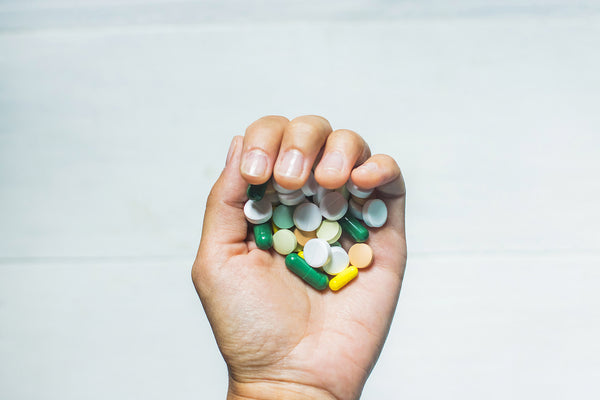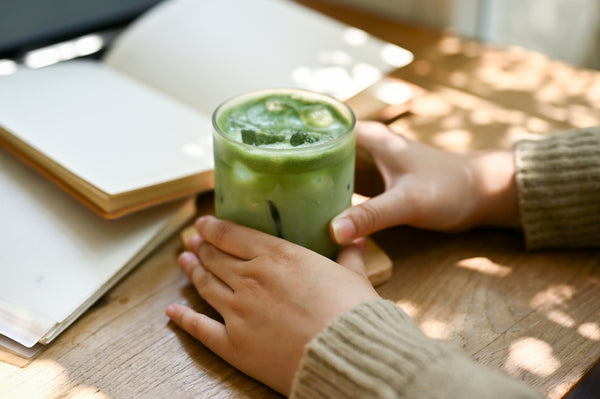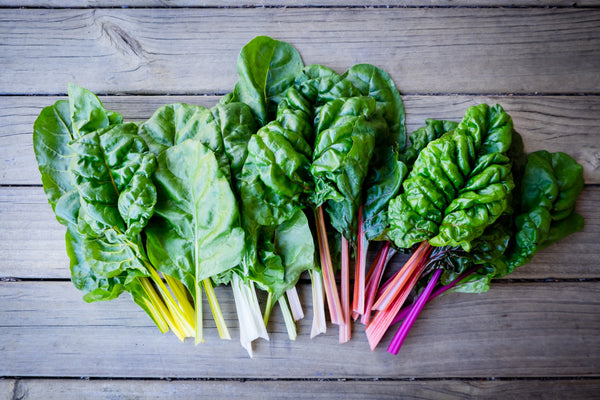The health benefits associated with matcha are extensive, and there’s a reason its popularity has boomed recently (although it’s been consumed in Japan for centuries).
Matcha tea boasts a high antioxidant and chlorophyll content, which, in turn, may help control inflammation, support heart and brain health, bolster immunity, boost liver function, and even help mitigate cancer risk. Additionally, research suggests that matcha may act as a natural blood thinner by reducing stroke and heart attack risk, enhancing blood flow, and regulating blood pressure.

However, individuals on prescription blood-thinning medication should exercise caution and consult with a trusted healthcare provider when consuming green tea or matcha due to its vitamin K content.
It’s crucial to note that this informative blog post does not replace professional medical advice. Always consult your medical provider, and it’s important to speak with your medical provider about any questions relating to matcha and blood thinners.
What is matcha?

Matcha is a type of green tea from Japan. It’s grown, harvested, and processed in a special way, giving it a higher antioxidant and chlorophyll content and unique nutrients and compounds. Because of this, matcha green tea powder is often referred to as a “superfood.” And for good reason!
In order to make matcha, Camellia sinensis tea plants (the same plant that produces green, black, and white tea) are shaded the last few weeks before harvest. This allows the leaves to produce more chlorophyll and amino acids and also gives matcha its incredible emerald coloring.
Young tea leaves are then hand-picked and steamed. Unlike when producing black tea, tea leaves are not allowed to oxidize. After being steamed, leaves are dried, sorted, and ground into a very fine powder. The grinding process is done very carefully to avoid any burning of the powder, which can destroy its nutrient content and give it a bitter taste and dull green/brown color (what you’ll often see in lower-quality matcha).
Can matcha help reduce blood clot risk?
Blood thinners, or anticoagulants, are used to prevent blood clots. Their name is a bit of a misnomer as they don’t actually thin the blood but rather make it harder for components of blood to stick together. Blood thinners can be a life-saving way to prevent heart attacks, strokes, and blockages.

Research has shown that some of the best ways to prevent blood clots and the need for blood thinners include exercising regularly, having normal blood pressure levels, improving heart health, maintaining a healthy weight, and reducing stroke risk through a healthy diet.
Drinking matcha green tea may be one of the easiest and most enjoyable ways to boost your diet to help improve heart health, maintain a healthy blood pressure level, maintain a healthy weight, and reduce the risk of stroke.
Research studies suggest that drinking green tea is linked with a lower risk of heart disease and that it may also help lower blood pressure. Uncontrolled high blood pressure is linked with a higher risk of heart disease, heart attack, and stroke. The antioxidants in matcha may also help lower LDL (bad) cholesterol. Additionally, research shows that the antioxidants in matcha can improve blood flow.
Green tea has also been shown to help with weight loss and maintaining a healthy weight by helping increase metabolism and fat burning.
Can you drink matcha if you’re taking a blood thinner?
Matcha contains numerous vitamins and minerals, all of which are essential for proper health. One of the vitamins matcha contains is vitamin K. Some sources of vitamin K include dark leafy greens like kale, chard, and spinach, cruciferous vegetables, and green tea.
Vitamin K is a fat-soluble vitamin crucial in blood clotting and building of bones. While green tea and matcha powder contain some vitamin K, they are not considered significant sources of this vitamin.

Blood thinners work by inhibiting a vitamin-K-dependent step in the production of blood clotting. This means that consuming high amounts of Vitamin K or foods rich in it can counteract the effects of certain types of blood thinners, as they work against each other.
However, the recommendation regarding vitamin K and blood thinners isn’t to avoid all foods that contain vitamin K but rather to stay consistent with your vitamin K consumption. This allows the body to maintain a proper balance between these two factors. It’s important to discuss your dietary habits with your healthcare provider so they can adjust your medication dosage accordingly in order to maintain this balance.
Also, note that not all blood-thinning medications have a food-drug interaction, so it’s essential you speak with your medical provider in order to come up with an appropriate course of action.
The bottom line
Matcha has many health benefits and may help support heart health, lower stroke risk, and help maintain a healthy weight. Blood thinners can be a life-saving medication that reduces the risk of forming a blood clot and, therefore, of having a heart attack, stroke, or blockage. Studies have also shown that it may also be possible to reduce your chance of needing a blood thinner by adopting a healthy diet and exercise routine. If you are taking blood thinners, speak with your doctor about drinking green tea, as it does contain vitamin K, which can interact with certain types of medication.
You may also like:
7 Reasons why Matcha is Good for Diabetics
Can Drinking Matcha Replace Statins?
Green Tea Anti-Aging and Inflammation Biomarkers
Disclaimer: These statements in this blog post have not been evaluated by the Food and Drug Administration. The information provided here is for educational purposes only and should not be considered as medical advice. It's essential to consult with a qualified healthcare professional before making any dietary or lifestyle changes.
Resources:
Babu PV, Liu D. Green tea catechins and cardiovascular health: an update. Curr Med Chem. 2008;15(18):1840-50. doi: 10.2174/092986708785132979. PMID: 18691042; PMCID: PMC2748751
Office of Dietary Supplements- Vitamin K. https://ods.od.nih.gov/factsheets/VitaminK-HealthProfessional/. NIH Office of Dietary Supplements. Date accessed: May, 7 2024
Pang J, Zhang Z, Zheng TZ, Bassig BA, Mao C, Liu X, Zhu Y, Shi K, Ge J, Yang YJ, Dejia-Huang, Bai M, Peng Y. Green tea consumption and risk of cardiovascular and ischemic related diseases: A meta-analysis. Int J Cardiol. 2016 Jan 1;202:967-74. doi: 10.1016/j.ijcard.2014.12.176. Epub 2015 Jan 4. PMID: 26318390.
Taylor JR, Wilt VM. Probable antagonism of warfarin by green tea. Ann Pharmacother. 1999 Apr;33(4):426-8. doi: 10.1345/aph.18238. PMID: 10332534.
Zamani M, Kelishadi MR, Ashtary-Larky D, Amirani N, Goudarzi K, Torki IA, Bagheri R, Ghanavati M, Asbaghi O. The effects of green tea supplementation on cardiovascular risk factors: A systematic review and meta-analysis. Front Nutr. 2023 Jan 10;9:1084455. doi: 10.3389/fnut.2022.1084455. PMID: 36704803; PMCID: PMC9871939.







